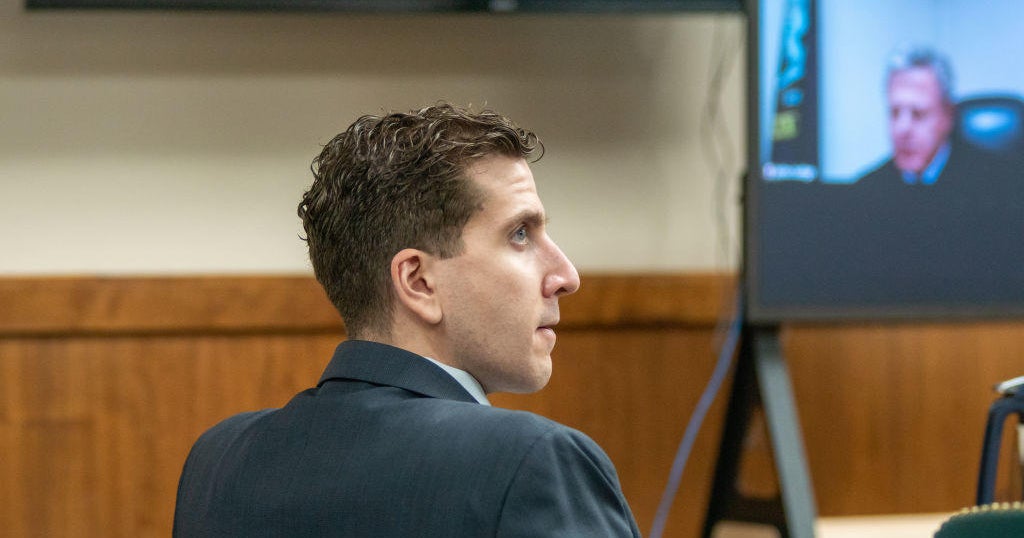Transcript: Defense Secretary Lloyd Austin on "Face the Nation," March 20, 2022
The following is a transcript of an interview with Defense Secretary Lloyd Austin that aired Sunday, March 20, 2022, on "Face the Nation."
MARGARET BRENNAN: The United Nations human rights office today said that at least nine hundred and two civilians have been killed in Ukraine, that number is likely much higher. Joining us now is the Secretary of Defense, retired General Lloyd Austin, just back from a trip to Bulgaria and Slovakia. Both NATO allies. Welcome to Face the Nation. Good to have you here in person, sir.
U.S. SECRETARY OF DEFENSE LLOYD AUSTIN: Thanks.
MARGARET BRENNAN: You just heard the horror-horrific reports of what's happening inside Mariupol. The AP is reporting a school that held hundreds of civilians was deliberately targeted. Can you confirm that?
SEC. AUSTIN: We've seen deliberate targeting of cities and towns and civilians throughout in the last several weeks. And- and again, I believe that he's taking these kinds of steps because as was described earlier his campaign is stalled. He's not been able to achieve the goals as rapidly- that he wants to achieve as rapidly as he wants to achieve them. And so he's- he's resorting to tact-ty-types of tactics that we- we see on display every day. And again, this is- this is really disgusting. But again, my hats off to- my hat off to the Ukrainian people who have fought valiantly and remain determined to defend their country.
MARGARET BRENNAN: What you're describing are war crimes. What has been described by one local leader in Mariupol is that there are residents being shipped to camps. Is Russia about to take that city, which would be a strategic victory?
SEC. AUSTIN: Well, hard to say. I mean, they've been- we've seen significant effort on their part to go after this city, go after Kyiv and other cities. They really want to begin to control the pop-population centers, but they haven't taken it yet. And we've seen in the past that Ukrainians have counterattacked, that they've- they've used their initiative to move things around on the battlefield, and they've presented some significant problems for the- for the Russians.
MARGARET BRENNAN: Russia is also saying that it used a hypersonic missile at least twice in Ukraine so far. So this is a missile that travels what more than a mile a minute. It's very difficult to intercept. Is this weaponry game changer?
SEC. AUSTIN: I would not see it as a game changer. I think again, the reason that he's resorting to using these types of weapons is because he's trying to reestablish some momentum. And we've see-, again, we've seen him attack towns and cities and civilians outright. We expect to see that continue. But I don't think that this in and of itself will be a game changer. You kind of question why he would- would do this. Is he running low on precision- precision guided munitions? Does he have like complete confidence in his ability to- the ability of his troops to reestablish momentum? But- but I don't see this in and of itself a game changer. I cannot confirm or dispute whether or not he's used those weapons.
MARGARET BRENNAN: Well, the U.S. assessment that is public is that Russia's got approximately 90 percent of their assembled combat power. So if they've lost 10 percent of combat power in twenty-five days, can they still be effective?
SEC. AUSTIN: Well, it's- they're- they're not being effective today in terms of their- their maneuver forces on the ground are--
MARGARET BRENNAN: Right.
SEC. AUSTIN: --essentially stalled. And it's been- it's had the effect of him moving his forces into a wood chipper. You know, the- the Ukrainians have continued to attrit his forces and they-they've been very effective, using the equipment that we provided them, you know, and armor weapons and aircraft weapons. And again, significant resolve on the part of the- of the Ukrainian people.
MARGARET BRENNAN: One of the concerns is that if Vladimir Putin is cornered that he would escalate to de-escalate that he would go and use a weapon of mass destruction. Do you expect to hear more threats about nuclear weapons? Is that a real, viable option for him?
SEC. AUSTIN: I would just say that any threat of the use of a nuclear weapon, any rhetoric concerning a use of a nuclear weapon is very dangerous. And- and so I remain confident in our ability to defend ourselves and our capabilities. But again, I don't think that kind of- that kind of conversation, that kind of rhetoric is helpful.
MARGARET BRENNAN: Mm-Hmm. But you take it seriously?
SEC. AUSTIN: Absolutely. And- and again, I'm confident in our ability to defend ourselves and defend our allies and partners as well.
MARGARET BRENNAN: One other option for a weapon of mass destruction that the Biden administration has warned about is a chemical or biological weapon. Vladimir Putin gave this chilling speech earlier this week where he claimed the Pentagon was supporting biological programs at dozens of labs in Ukraine, which the Biden administration has just said that's completely false information. China has repeated this as a talking point, though. Would using a weapon of mass destruction like this change the US calculus? Is there a level of catastrophe here where the United States could not sit on the sidelines?
SEC. AUSTIN: I- I think if a chemical or biological weapon was used, you would see- as- a significant reaction from not only the United States, but also the global community. And again, I don't want to speculate about what exactly would change our calculation. I think- I think, you know, engaging in hypotheticals is probably not helpful here, either. But I think this is- this is a very serious step. And as you heard our president say, we won't- we won't take that likely.
MARGARET BRENNAN: And when Vladimir Putin talks about that, you think it becomes more likely?
SEC. AUSTIN: I think what- what we've seen from the Russians in the past is they're raising issues and creating a pretext so that if they did something in the battle space, they could blame it on- on somebody else, either Ukrainians or- or us, NATO.
MARGARET BRENNAN: Mm-Hmm.
SEC. AUSTIN: And this could possibly- possibly be- be what we- what we're seeing today.
MARGARET BRENNAN: Secretary of State Blinken has said private mercenaries are being mobilized to move into Russia or to move into Ukraine by Russia. Are you seeing Russia send in reinforcements?
SEC. AUSTIN: We've heard them. We've heard about it from a number of sources that this is in fact going on. We've not seen mercenaries show up on the battlefield, to my knowledge.
MARGARET BRENNAN: and no reinforcements yet from foreign sources.
SEC. AUSTIN: No
MARGARET BRENNAN: Moscow is blasting the United States for pouring in weapons, you talked about all the things that are game changers, you say the anti-tank, the stingers, the eight hundred million that the president authorized and secretary of state signed off on. When does that equipment begin to arrive? And what makes the most difference in terms of what we are providing Ukraine?
SEC. AUSTIN: We've been providing this type of equipment throughout, and this enables us to provide more. In the last two weeks, we've provided over $300 million worth of equipment to Ukraine and the $800 million that the – that the the president signed off on here just recently brings a total to over to $2 billion in terms of the amount of security force assistance that we've been providing to Ukraine. I would remind you that we've had trainers there since 2014, along with some of our other allies. And not only have we provided them equipment, but they were ready to use that equipment once we provided.
MARGARET BRENNAN: Equipment that the Ukrainians say they want are to help close the skies, essentially. These S-300 systems, the Russian-made systems that are in Eastern Europe right now, how quickly can you get that into the hands of the Ukrainians?
If we if we can get it in, if our allies or partners do have this type of equipment available –
MARGARET BRENNAN: Slovakia says they're ready to go.
SEC. AUSTIN – they're ready to go. And so what we'll do is we'll continue to work with them and continue to work with other allies and partners to not only create the conditions to provide that kind of assistance, but also, you know, work to ensure that they have the ability to to protect their skies going forward as well.
MARGARET BRENNAN: All right, we will watch your trip to Europe again. Mr. Secretary, thank you for your time.
SEC AUSTIN: Thanks.
MARGARET BRENNAN: Face theNation, we'll be back in a minute. Stay with us.



